($32): This Rosé, made entirely from Pinot Noir, has the intensity of flavor you’d expect from a wine made from red grapes and a gorgeous rosy pink color. Made by the classic — that is, Champagne — method of a secondary fermentation in the bottle (metodo classico, in Italian), an elegant suaveness balances its power. … Read more
Category Archives: WRO Reviews
Presqu’ile, Santa Maria Valley (Central Coast) Sauvignon Blanc 2013
($22): Santa Maria Valley is one of the many coastal valleys in California that runs east to west, which means that cooling winds from the Pacific Ocean moderate the temperature and make it an ideal site for grape varieties such as Pinot Noir, Chardonnay and Sauvignon Blanc, that thrive in “cooler” weather.… Read more
Presqu’ile, Santa Maria Valley (Central Coast) Chardonnay 2011
($37): Let’s hope more California wineries follow the style of Presqu’ile’s 2011 Chardonnay. This restrained wine displays a gorgeous combination of richness and energy. Its subtle richness becomes increasingly apparent with each sip–it sneaks up on you as opposed to hitting you over the head. … Read more
Mount Nelson, Marlborough (New Zealand) Sauvignon Blanc 2012
($18, Wilson Daniels): Ludovico Antinori, who with his brother Piero established Mount Nelson Winery in 2003, knows a thing or two about Sauvignon Blanc, having made an outstanding one at Ornellaia in Bolgheri for many years. In addition to the typical, easily recognizable pungency and bite you’d expect from a Sauvignon Blanc from the Marlborough region on the northern tip of New Zealand’s south island, the 2012 Mount Nelson has a subtle, but mouth-filling creaminess. … Read more
Kumeu River, Aukland (New Zealand) Chardonnay ‘Village’ 2011
($20, Wilson Daniels): 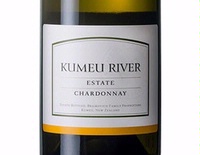 I’ve not tasted all the Chardonnays from New Zealand, so I can’t say that Kumeu River is that country’s top producer of that varietal. But I can say that I haven’t found a better one from that country yet. … Read more
I’ve not tasted all the Chardonnays from New Zealand, so I can’t say that Kumeu River is that country’s top producer of that varietal. But I can say that I haven’t found a better one from that country yet. … Read more
Kumeu River, Auckland (New Zealand) Chardonnay Coddington Vineyard 2011
($45, Wilson Daniels): 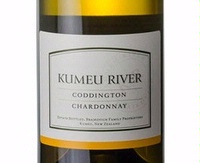 Kumeu River has bottled this Chardonnay separately since 2006 because it believes it is unique. Having recently tasted the entire line-up of Chardonnays, I agree. Indeed, all its single-vineyard bottlings are different and show that the French don’t have a monopoly of the concept of terroir.… Read more
Kumeu River has bottled this Chardonnay separately since 2006 because it believes it is unique. Having recently tasted the entire line-up of Chardonnays, I agree. Indeed, all its single-vineyard bottlings are different and show that the French don’t have a monopoly of the concept of terroir.… Read more
I Saltari, Valpolicella Superiore (Veneto, Italy) Le Vigne di Turáno 2010
($18, Banfi Vintners): Sartori, one of the Veneto’s top producers, owns the I Saltari estate, which helps explain why the wines are so stunning. Andrea Sartori attributes the exceptional quality of this single-vineyard wine to careful viticulture coupled with low yields. … Read more
Castello Banfi, Toscana IGT (Italy) Cum Laude 2010
($37, Banfi Vintners): Castello Banfi, best known for its stunning Brunello di Montalcino, also produces an array of “Super Tuscan” wines, one of which is Cum Laude, an unconventional blend of Cabernet Sauvignon, Merlot, Sangiovese and Syrah. The 2010 Cum Laude may be their best ever. … Read more
Principessa Gavia, Gavi DOCG (Piedmont, Italy) 2013
($15, Banfi Vintners): Though Piedmont is best known for its regal red wines, Barolo and Barbaresco, the region is home to a noteworthy white, Gavi, which takes its name from the town where the Cortese grape grows best. The 2013 from Principessa Gavia entices you with its delicate aromas of white flowers.… Read more
Cerulli Spinozzi, Montepulciano d’Abruzzo Colline Teramane (Abruzzo, Italy) “Torre Migliori” 2008
($17, Banfi Vintners): Cerulli Spinozzi’s Torre Migliori has all of the concentration that Montepulciano d’Abruzzo is known for, but with a complexity and elegance that is rarely seen in wines made from that grape. It’s easy to see why Colline Teramane is Abruzzo’s sole DOCG. … Read more
Cerulli Spinozzi, Colli Aprutini IGP (Abruzzo, Italy) Pecorino “Cortalto” 2013
($13, Banfi Vintners): 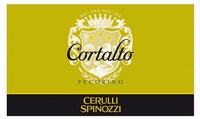 It’s not just a cheese. Pecorino (from “pecora,” the word for sheep in Italian) is also a grape native to Abruzzo and Marche, regions on the Eastern side of the Italian peninsula. Enrico Cerulli Irelli, family proprietor of Cerulli Spinozzi, speculates that the grape got its name because sheep grazing on adjacent pastures would nibble at the vines. … Read more
It’s not just a cheese. Pecorino (from “pecora,” the word for sheep in Italian) is also a grape native to Abruzzo and Marche, regions on the Eastern side of the Italian peninsula. Enrico Cerulli Irelli, family proprietor of Cerulli Spinozzi, speculates that the grape got its name because sheep grazing on adjacent pastures would nibble at the vines. … Read more
Snoqualmie, Columbia Valley (Washington) Cabernet Sauvignon 2011
($13): Snoqualmie highlights and emphasizes its eco-friendly practices — organic grapes, recycled paper — you get the idea. But to me what sets it apart is its incredible value-packed wines. This Cabernet — made from organic grapes — is a stunning, unbelievable $13 bottle of wine. … Read more
Snoqualmie, Columbia Valley (Washington) Cabernet Sauvignon Reserve 2011
($20): 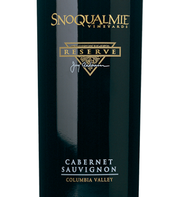 As enthusiastic as I am for Snoqualmie’s regular Cabernet, the Reserve is even more eye-popping. To reiterate, similar to Snoqualmie’s regular Cabernet, the quality of this Reserve Cabernet is extraordinary, considering the price. It’s longer and more concentrated — filled with black fruit-like flavors, herbal notes and spice — but thankfully, it’s not one of those massive “killer” Cabernets. … Read more
As enthusiastic as I am for Snoqualmie’s regular Cabernet, the Reserve is even more eye-popping. To reiterate, similar to Snoqualmie’s regular Cabernet, the quality of this Reserve Cabernet is extraordinary, considering the price. It’s longer and more concentrated — filled with black fruit-like flavors, herbal notes and spice — but thankfully, it’s not one of those massive “killer” Cabernets. … Read more
Planeta, DOC Moscato di Noto (Sicily, Italy) 2013
($22, Palm Bay International): Using both international and indigenous grapes, Planeta, a visionary producer, is showing the world that high-quality wine comes from Sicily, the island that not long ago had a reputation for quantity over quality. This Moscato di Noto, another surprise from this talented producer, captures your attention with the first aromatic whiff. … Read more
Planeta, DOC Vittoria (Sicily, Italy) Frappato 2013
($22, Palm Bay International): Planeta has made an utterly charming wine entirely from Frappato, a grape more often blended with Nero d’Avola for Sicily’s DOCG wine, Cerasuolo di Vittoria. As a stand-alone, Planeta’s Frappato is a light to mid-weight juicy red-fruited wine with an alluring hint of smokiness and a faint — and welcome — bitterness in the finish. … Read more
Planeta, DOC Noto (Sicily, Italy) Santa Cecilia 2009
($42, Palm Bay International): Planeta considers Santa Cecilia, made exclusively from Nero d’Avola at its Noto estate, one of its six wineries spread over the island, to be its flagship red wine. I’ve always loved the Santa Cecilia because of the complexity it shows and enjoyment it delivers when young.… Read more
Planeta, Cerasuolo di Vittoria DOCG (Sicily, Italy) 2011
($24, Palm Bay International): Cerasuolo di Vittoria, one of Sicily’s two DOCG wines (along with Cerasuolo di Vittoria Classico), is a blend of two indigenous grapes, Frappato and Nero d’Avola. Francesca Planeta considers Cerasuolo di Vittoria Sicily’s “Pinot Noir.” Planeta’s 2011, fragrant, pure and precise, focuses on the fruitiness of the blend. … Read more
Planeta, Cerasuolo di Vittoria Classico DOCG (Sicily, Italy) Dorilli 2011
($33, Palm Bay International): Though Planeta is a Sicilian producer — and a great one at that — they trumpet the idea that Sicily has many different terroirs. Just as we no longer refer to “Chinese” food given the diversity of flavors coming from that country, people should stop thinking of “Sicilian” wine. … Read more
Château d’Oupia, Minervois Rosé (Languedoc, France) 2013
($13, Louis Dressner Selections): Château d’Oupia, one of the most reliable producers in the Languedoc, has fashioned an engaging rosé from the usual Mediterranean blend of Syrah, Grenache and Cinsault. A deeper color than most rosé, it delivers more spice and character than you’d expect along with bright fresh acidity that lends refreshing verve. … Read more
Suenen, Champagne (France) Blanc de Blancs, Extra Brut NV
($63): Suenen is a small family run “grower” Champagne producer based in Cramant, one of the top villages in the Champagne region for Chardonnay. The so-called “grower” Champagnes are produced from the family’s own vineyards without relying on purchased grapes as most of the big name houses do. … Read more
Maison Louis Jadot, Corton Charlemagne (Burgundy, France) 2011
($120, Kobrand Wine And Spirits): 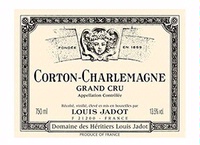 Jadot’s Corton Charlemagne comes from its vineyard on the well-positioned southeastern facing Pougets plot on the Corton hill. I was unenthusiastic about the 2011, a wine I usually love, when I tasted it from barrel in Jadot’s cellars because I thought it lacked energy and verve. … Read more
Jadot’s Corton Charlemagne comes from its vineyard on the well-positioned southeastern facing Pougets plot on the Corton hill. I was unenthusiastic about the 2011, a wine I usually love, when I tasted it from barrel in Jadot’s cellars because I thought it lacked energy and verve. … Read more
Bodegas Garzón, Uruguay (Uruguay) Tannat 2012
($20, Blends Inc): I was expecting a dark, inky robust wine from this Tannat, the grape whose traditional home is Madiran in Southwest France. What I didn’t expect was the elegance and silky tannins. (Silky is not a word ever used to describe the wines from Madiran). … Read more
Bonny Doon, Monterey County (California) Grenache “Clos de Gilroy” 2013
($20): 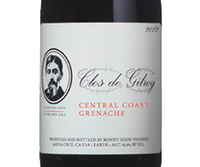 Randall Grahm, proprietor of Bonny Doon, is a winemaker who sets his own course and follows it. Far before lower alcohol wines became the new mantra of California (let’s hope that’s not going to be a passing fad) Grahm was making well-proportioned flavorful wines. … Read more
Randall Grahm, proprietor of Bonny Doon, is a winemaker who sets his own course and follows it. Far before lower alcohol wines became the new mantra of California (let’s hope that’s not going to be a passing fad) Grahm was making well-proportioned flavorful wines. … Read more
Bonny Doon, Central Coast (California) Syrah “Le Pousseur” 2012
($26): This is a ripe, full-bodied and wonderfully balanced expression of Syrah, focusing more of the black fruitiness of that variety rather than its peppery profile. Still, it’s not just fruit. Earthy nuances provide complexity. A glorious silky texture makes it easy to enjoy now with robust fare.… Read more
Truchard, Carneros (Napa Valley, California) Pinot Noir 2012
($35): 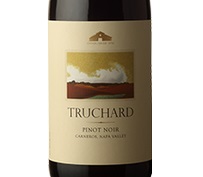 Since the 1940s when Louis M. Martini planted Pinot Noir and Chardonnay on the Stanly Ranch in Carneros, California growers have been enthralled by those varieties in that locale. Indeed, Carneros is the only AVA to be defined by geographic parameters instead of political ones. … Read more
Since the 1940s when Louis M. Martini planted Pinot Noir and Chardonnay on the Stanly Ranch in Carneros, California growers have been enthralled by those varieties in that locale. Indeed, Carneros is the only AVA to be defined by geographic parameters instead of political ones. … Read more
Bodegas Hornillos Ballesteros, Ribera del Duero (Spain) “Mibal” 2011
($17, Ole Imports): This Tempranillo-based wine is robust without being heavy because perky acidity keeps it fresh and lively. Savory notes mingle with the dark fruity flavors. There’s a food-friendly subtle and attractive bitterness in finish. Fine tannins allow you to enjoy it now with hearty fare. … Read more
Cloudy Bay, Marlborough (New Zealand) Sauvignon Blanc 2012
($26): Cloudy Bay put New Zealand Sauvignon Blanc on the world’s wine map in the late 1980s. They have not rested on their laurels. They continue to be a benchmark for that varietal. Along with the bright edginess and bite we’ve come to associate with Marlborough Sauvignon Blanc, Cloudy Bay’s version has an appealing weight and the barest whiff of creaminess that adds an extra dimension and fills out the wine. … Read more
Mionetto, Valdobbiadene Prosecco Superiore DOCG (Italy) “Luxury” Extra Dry NV
($20): Mionetto, one of Prosecco’s leading producers, bottles a number of different ones. This one, an Extra-Dry — which paradoxically means it’s not the driest — is delicate and lacey. Slightly rounder than a Brut, it nonetheless has a refreshing crispness and green apple-like flavors. … Read more
Vietti, Moscato d’Asti (Piedmont, Italy) “Cascinetta” 2013
($18): Vietti is truly one of Piedmont’s — and Italy’s — most talented producers. They bottle a stunning array of Barolo and Barbaresco. But I didn’t realize they have figured out how to bottle springtime. With just 5.5 percent stated alcohol, a bit of sweetness and a little refreshing fizziness for balance, this Moscato d’Asti is just that — spring in a bottle. … Read more
Georges Laval, Champagne (France) “Brut Nature” NV
($85, Transatlantic Bubbles): Georges Laval makes, what’s known in the industry, as “grower” Champagne. That is, he makes Champagne from grapes grown in his own vineyards. That’s in contrast to the big houses that own relatively little land and buy grapes from growers throughout the Champagne region. … Read more
Maison Joseph Drouhin, Rully (Burgundy, France) 2012
($22, Dreyfus Ashby & Co): Warmer years like 2012 or 2009 benefit Burgundy appellations, such as Rully, in the Côte Chalonnaise whose wines can often come across as lean in cooler vintages. Drouhin’s 2012 Rully has plenty of ripe juicy red fruit flavors to balance the stony firmness you’d expect from the wines of this appellation. … Read more
Château de Chamirey, Mercurey 1er Cru (Burgundy, France) Clos du Roi 2010
($50): The Château de Chamirey, one of the finest producers in Mercurey, owns about one-third of Clos du Roi, a 30-acre premier cru vineyard. They’ve divided their 10-acres into four distinct plots identified by different soils, which produce Pinot Noir that ripens at slightly different times. … Read more
Domaine de Suremain, Mercurey (Burgundy, France) 2012
($30): Domaine de Suremain is a top producer in Mercurey, a village in the Côte Chalonnaise where authentic Burgundy can be found at reasonable prices. The 2012 vintage was especially kind in there because it gave the wines a touch extra ripeness that balances the characteristic firmness of the region. … Read more
Domaine Tollot-Beaut, Chorey-lès-Beaune (Burgundy, France) Pièce du Chapitre 2009
($42): None of the 375 acres of vineyards in Chorey-lès-Beaune, a small village just north of Beaune (lès means near), are classified as premier cru because they lie on the flat land as opposed to the better situated sites on the slope. … Read more
Château Faizeau, Montagne-Saint-Emilion (Bordeaux, France) “Sélection Vieilles Vignes” 2010
($25): 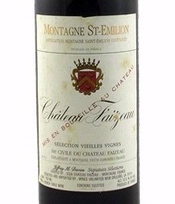 Montagne-Saint-Emilion, a “satellite” appellation of Saint-Emilion, lies adjacent to the north of that revered appellation. The wines from this satellite are never as grand or complex, but then again they’re never as pricey. Indeed, good values, such as Chateau Faizeau, are everywhere in Montagne-Saint Emilion, especially in a great year, such as 2010. … Read more
Montagne-Saint-Emilion, a “satellite” appellation of Saint-Emilion, lies adjacent to the north of that revered appellation. The wines from this satellite are never as grand or complex, but then again they’re never as pricey. Indeed, good values, such as Chateau Faizeau, are everywhere in Montagne-Saint Emilion, especially in a great year, such as 2010. … Read more
Nigl, Kremstal (Niederösterreich, Austria) Grüner Veltliner “Freheit” 2012
($20): Grüner Veltliner, Austria’s “national” white grape, is capable of making delectable wines. And Nigl has done just that. There’s a hint of white pepper that beautifully offsets subtle peach-like flavors. Potent acidity keeps in bright and lively throughout a meal. … Read more
Merry Edwards, Russian River Valley (Sonoma County, California) Pinot Noir NV
($45): Merry Edwards consistently produces a stunning array of Pinot Noir and 2011 was no exception. This one, a blend from vineyards within the Russian River Valley, is the most straightforward and most immediately appealing. Hints of sweet oak are still apparent but marry well with savory notes. … Read more
Merry Edwards, Russian River Valley (Sonoma County, California) Pinot Noir Flax Vineyard 2011
($54): Merry Edwards has a reputation for bottling Pinot Noir from several individual vineyards within the Russian River Valley. Tasting them side-by-side validates her judgment that the wines are different and deserve their separate designations. These single vineyard wines reflect inherent differences in the vineyards (aka terroir) and bottling them separately has great merit because it shows the wonderful diversity of the Russian River Valley. … Read more
Merry Edwards, Russian River Valley (Sonoma County, California) Pinot Noir Meredith Estate 2011
($57): Merry Edwards’ Meredith Estate Pinot Noir has a lot in common with the Klopp Ranch bottling in that it’s weighty but not heavy and has Merry Edwards’ signature, a plush texture. But worthy of a single vineyard bottling, it’s distinctive. … Read more
Merry Edwards, Russian River Valley (Sonoma County, California) Pinot Noir Klopp Ranch 2011
($57): Merry Edwards’ Klopp Ranch bottling of Pinot Noir is wonderfully different from her other single vineyard wines. It’s denser still, with more concentrated black fruit flavors, yet still avoids being heavy because of lip-smacking acidity. At this stage, there’s a smattering of savory notes that emerges with time in the glass. … Read more
Château de Chamirey, Mercurey 1er Cru (Burgundy, France) Les Ruelles 2011
($44): 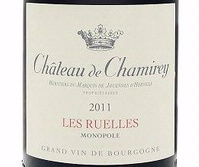 Château de Chamirey is one of the top producers in Mercurey, probably the best village in the Côte Chalonnaise for red wine. You can’t really go wrong with any of their wines. Les Ruelles, a premier cru vineyard owned exclusively by Château de Chamirey, is especially attractive in 2011. … Read more
Château de Chamirey is one of the top producers in Mercurey, probably the best village in the Côte Chalonnaise for red wine. You can’t really go wrong with any of their wines. Les Ruelles, a premier cru vineyard owned exclusively by Château de Chamirey, is especially attractive in 2011. … Read more
Duckhorn Vineyards, Napa Valley (California) Merlot Three Palms Vineyard 2011
($95): It’s hard to remember, but as recently as 1978, just two years after Dan and Margaret Duckhorn founded their eponymous winery, Merlot was rarely bottled in California as a varietal wine. The grape was used primarily for blending — to “soften” Cabernet Sauvignon. … Read more
Tenuta Alzatura, Sagrantino di Montefalco (Umbria, Italy) 2008
($41, Banfi Imports): Combine the owner of Tenuta Alzatura, the Cecchi family, one of Tuscany’s most reliable producers, with a superb vintage, 2008, and you’d expect an outstanding wine just from the label. What’s in the bottle confirms your prediction. Mind you, this wine, as good as it is, is not for the faint of heart. … Read more
Rocca delle Macie, Chianti Classico Riserva (Tuscany, Italy) 2009
($23, Palm Bay International): Reflective of the warmer vintage in Tuscany, Rocca delle Macie’s 2009 Chianti Classico Riserva conveys a juicier and riper cherry-like fruitiness than usual. Still, it has plenty of that mouth tingling acidity that makes matching Chianti with pasta with a hearty meat sauce such a pleasure. … Read more
Château du Galoupet, Côtes de Provence (France) 2013
($18): This dry, vibrant rosé, a blend of the usual Mediterranean grapes, Grenache, Cinsault and Syrah, delivers a delicate fruitiness on a firm frame. Invigorating grapefruit-like acidity keeps it fresh and a perfect foil for a hearty springtime salad.
90 Michael Apstein Apr 8, 2014… Read more
Caves d’Esclans, Côtes de Provence (France) “Whispering Angel” 2013
($20): This rosé combines the seriousness of real wine with the charm and seduction of rosé. Delicate and fragrant strawberry-like notes dance across the palate. Without a hint of sweetness, it’s positively fresh, invigorating, and long, all at the same time. … Read more
Château d’Esclans, Côtes de Provence (Provence, France) “Les Clans” 2012
($60, Shaw-Ross International Importers): Sacha Lichine, whose name is synonymous with Bordeaux, is the moving force behind this very high end property in Provence specializing in rosé. Since I am not usually enthralled by rosé, I am surprised by my 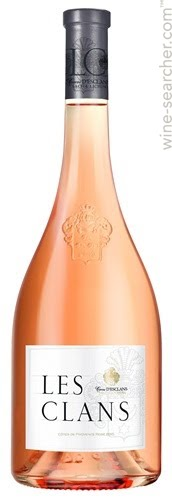 enthusiasm for this and his other wines. … Read more
enthusiasm for this and his other wines. … Read more
Maison Louis Jadot, Saint-Véran (Burgundy, France) 2012
($16, Kobrand Wine And Spirits): St. Véran, an appellation nestled between Mâcon-Villages and Pouilly-Fuissé in prestige is often a fine value, offering a more sophisticated wine than the former at a price lower than the latter. Jadot’s 2012 is just that. … Read more
Maison Louis Jadot, Mâcon-Villages (Burgundy, France) 2012
($13, Kobrand Wine And Spirits): The 2012 vintage produced ripe white Burgundies, especially good news for “lesser” appellations, such as Mâcon-Villages, whose wines benefit from a touch more ripeness. Jadot, one of Burgundy’s top producers, captured sufficient acidity to balance the ripe apple-like flavors. … Read more
Domaine William Fevre, Chablis Grand Cru (Burgundy, France) Vaudésir 2012
($80, Henriot, Inc.): Vaudésir is always among the top two vineyards in any ranking of Chablis Grand Cru (Les Clos is the other). And Domaine William Fevre is one of Chablis’ consistently finest producers. So it’s not surprising that this is a stunningly stellar wine. … Read more
